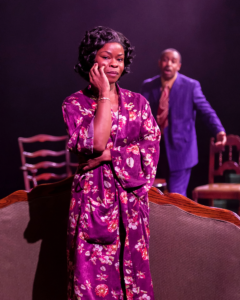B. Franklin
B. Franklin
“Be civil to all; sociable to many;
familiar with few; friend to one;
enemy to none.”
Like Diddy said in the late 90s, “it’s all about the Benjamins.” However, in this case, it’s about one Benjamin who was a patriot, a notorious ladies’ man and a witty man. Like the rest of us mere mortals, Franklin had a tense relationship with his lawyer son William Temple Franklin. The product of a one-night stand. They were on opposite sides of politics. Franklin was all about bringing down King George while the younger version is pro-George. I wouldn’t want to be a guest at that dinner table.
The elder Franklin is a charming, highly intelligent and clever soul. It’s no wonder that he loved the ladies and the ladies most certainly loved him. The audience first meets the elderly political leader in the last stage of his life. He walks with a cane, bald on top but still wears his grey hair long on the sides and back. His ailing body doesn’t prevent him from continuing his government services. He treks a trip to Canada in winter to seek an alliance. William issues an arrest order on his father one summer. At that time, William was governor of New Jersey. Franklin was heavily concerned with his enemies closing in, especially with Arthur Lee. Lee was an American diplomat named as a Massachusetts correspondent to Britain and France. He meets Franklin in London where he criticized his extravagant lifestyle and told the Founding Father of the United States, Samuel Adams, that he didn’t believe that Franklin would make a good negotiator regarding the interests of Pennsylvania.
Just like that, Lee became an instant enemy. While that nonsense was going on, Franklin’s son was charged with the murder of a continental army officer. For reasons he keeps to himself, Franklin refused to bail William out. Their political views kept them permanently estranged.
Robert Lesko gives a tremendously excellent performance. He provides wit, charm with an amusing demeanor. Lesko describes Franklin as a bookish boy who would read every book he could find. He highly emphasizes the elderly statesman on his sexual prowess with women. However, let’s not confuse his love for women surpass his job as a diplomat. Franklin was astute and extremely involved in politics and often did more than his share of the work to keep away from being under the thumb of King George. Remember, it cost him the already strained relationship with his oldest child. It’s clear that Lesko did his homework on Franklin and emits that energy across the stage.
Lesko would have been a great history teacher. His live action and extended knowledge of Franklin would excite young and old minds. He makes it fun to learn, observe and question. By involving Franklin’s personal life and work identity, he created a real life human being the audience can easily relate to and enjoy. Lesko also shows off Franklin’s intellectual thoughts on just about everything in life. Even when Franklin becomes weary, he is not at a loss for words. He ends with this last note.
“The years roll round and the last will come. When it does rather than have, it said of me, ‘B. Franklin, Printer, died rich.’ I would prefer, ‘B. Franklin, Printer, lived usefully.’ I am weary. Oui, je suis fatigue. I beg your indulgence, I must sleep.”
Excellent work!
B. Franklin plays until this weekend Sunday, April 27. Friday and Saturday at 8 p.m., Sunday, at 2 p.m. at the Stephanie Feury Studio Theatre, located at 5636 Melrose Avenue at Larchmont. For ticket information, call (800) 838-3006 or reserve online at www.bfranklin.brownpapertickets.com.
The 5 minute interview
How much research was involved from politics to family to mistresses?
I spent about 10 years researching B. Franklin, with the last few years focusing on his relationship with his son William (Billy). Politics, family, lady friends, scientific work, and business are common threads running through all Franklin biographies and related historical works.
Was there anything you found that surprised you about the man?
At the start I knew nothing about his son William and their close relationship lasting over 45 years until their political differences intervened to destroy their bond.
What appealed you to do a show about Franklin?
At the start of my reading I just held a layman’s interest in Ben and his incredible, wide ranging genius. But as I kept at it I got the idea that there may be a play to be made if I could find the right dramatic spine. The discovery of Ben’s relationship and dramatic estrangement from Billy provided the potential drama, so I went to work producing countless versions and drafts.
Do you think he was paranoid about his “enemies”?
Ben was not paranoid about his enemies–they were real on both sides of the Atlantic. What we must remember was that Ben was an outlier. But for a small cadre of “radicals,” including the Adams of Massachusetts, most American colonists were true and loyal to Britain and the Crown through 1775/1776. When Ben returned from England after 18 years in 1775, many of the “radicals” were skeptical of his conversion and some thought him a spy for the Crown. In France, Arthur Lee, Ralph Izzard, John Adams, and many others thought he was a libertine wasting time and money while becoming “Frenchified.” The French valued Franklin much more than did his fellow American colonists.
What is your next project and when can we see it?
My next project will be to promote B. Franklin and perform it at other venues.


